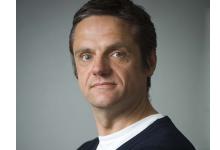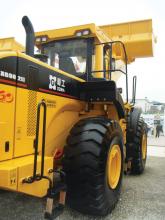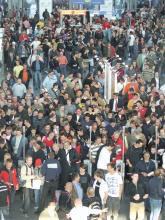The construction equipment market has been hit hard in Europe and further afield, with economic uncertainty slowing orders. But there is light on the horizon. A range of key industry speakers made presentations at the recent Committee for European Construction Equipment (CECE) congress in Berlin, outlining prospects for the next few years in Europe as well as around the world.
The construction equipment market has been hit hard in Europe and further afield, with economic uncertainty slowing orders. But there is light on the horizon. A range of key industry speakers made presentations at the recent 2440 Committee for European Construction Equipment (CECE) congress in Berlin, outlining prospects for the next few years in Europe as well as around the world.
CECE president Johann Sailer said, “Although the absolute level of demand for construction equipment in Europe is still fine, the mood of European companies is changing.”
He continued, “Markets like Spain and Italy had to face even further decreases in the first half of the year while others like the Scandinavian and Baltic markets or even Turkey have experienced a good rise in demand.”
Sailer added, “The outlook for 2013 is rather pessimistic. Beyond Europe, it is especially the weak Chinese market that worries the industry. In China, local construction equipment sales have dropped by 40% in the first half of the year and will probably end up with a 25% decline by the end of it.”
During the first half of 2012, CECE says that earthmoving equipment sales did not change much in comparison with the previous year. Sailer said, “In total more than 28,000 units were sold. Wheeled excavators were the best performing product group with sales unchanged compared with 2011.”
He explained that the market for compaction equipment is also in good order, although this growth could come to an end with the close of 2012. He continued, “Self-propelled rollers are still in a growth phase while sales of asphalt paver remain almost unchanged from 2011.”
Stefan Schilbe, chief economist for the5791 HSBC bank was more positive. He said, “China has seen some slowdown over the last few months and this has calmed down the economy. In the US we are about to see some growth.”
Schilbe continued that Europe will see some growth next year, “We have lots of liquidity but this is not reaching the economy. At least we are moving in the right direction. We will see some kind of improvement over time.”
Franke Dupré, vice president of the European contractor’s association, the FIEC said, “European and national recovery plans have made an important contribution. We have kept repeating we must not be complacent and more measures need to be implemented. Construction is not the problem, construction is the solution. It can put the EU back on track. We need banks to lend to viable companies.”
David Philips, managing director of research specialist2444 Off-Highway Research said that western markets will improve, albeit slowly, “I see a slow, rather anaemic recovery in the US and parts of Europe.”
India will continue to grow but Philips said, “Growth will be erratic but assured, in spite of the government!”
He said that China will see gains in 2013. “This year we’re seeing a correction. The2719 Chinese Government wanted to slow an overheated market. We’ve seen a drop this year but I think we’ll see a recovery.” He added that the new Chinese Government will invest and said, “I think the new government will restimulate the economy in June and that will restimulate the world economy as well.”
Jonny Altstadt is vice president of Brazilian construction association Sobremata and he said that with the discovery of petroleum deposits off the coast of the country, its growth will continue. The country’s PAC 2 economic growth programme is now underway and will see a series of infrastructure projects commencing, including extensive highway work. The budget for the 2011-2014 period was set at close to US$480 billion, while some $315.8 billion will be spent following 2014. And he added that in the 2012-2017 period Brazil will invest $36 billion on highway construction and a further $20 billion on urban roads.
Andrey Komov of359 Volvo CE Russia commented, “The Russian economy is fragile and there is a lot of dependency on the oil price.” But he added, “Foreign investments are coming back slowly. The market is far from being saturated and the potential is big. But global issues and economy fuels the Russian market.”
Komov said that there is still huge need in Russia for road building however. “Russia has one million km of roads and estimates suggest it needs more than double that.”
CECE president Johann Sailer said, “Although the absolute level of demand for construction equipment in Europe is still fine, the mood of European companies is changing.”
He continued, “Markets like Spain and Italy had to face even further decreases in the first half of the year while others like the Scandinavian and Baltic markets or even Turkey have experienced a good rise in demand.”
Sailer added, “The outlook for 2013 is rather pessimistic. Beyond Europe, it is especially the weak Chinese market that worries the industry. In China, local construction equipment sales have dropped by 40% in the first half of the year and will probably end up with a 25% decline by the end of it.”
During the first half of 2012, CECE says that earthmoving equipment sales did not change much in comparison with the previous year. Sailer said, “In total more than 28,000 units were sold. Wheeled excavators were the best performing product group with sales unchanged compared with 2011.”
He explained that the market for compaction equipment is also in good order, although this growth could come to an end with the close of 2012. He continued, “Self-propelled rollers are still in a growth phase while sales of asphalt paver remain almost unchanged from 2011.”
Stefan Schilbe, chief economist for the
Schilbe continued that Europe will see some growth next year, “We have lots of liquidity but this is not reaching the economy. At least we are moving in the right direction. We will see some kind of improvement over time.”
Franke Dupré, vice president of the European contractor’s association, the FIEC said, “European and national recovery plans have made an important contribution. We have kept repeating we must not be complacent and more measures need to be implemented. Construction is not the problem, construction is the solution. It can put the EU back on track. We need banks to lend to viable companies.”
David Philips, managing director of research specialist
India will continue to grow but Philips said, “Growth will be erratic but assured, in spite of the government!”
He said that China will see gains in 2013. “This year we’re seeing a correction. The
Jonny Altstadt is vice president of Brazilian construction association Sobremata and he said that with the discovery of petroleum deposits off the coast of the country, its growth will continue. The country’s PAC 2 economic growth programme is now underway and will see a series of infrastructure projects commencing, including extensive highway work. The budget for the 2011-2014 period was set at close to US$480 billion, while some $315.8 billion will be spent following 2014. And he added that in the 2012-2017 period Brazil will invest $36 billion on highway construction and a further $20 billion on urban roads.
Andrey Komov of
Komov said that there is still huge need in Russia for road building however. “Russia has one million km of roads and estimates suggest it needs more than double that.”








